-
The Role of Landfills
If your business is like many others, then you rely heavily on dumpster rental services or trash pickup near Atlanta. Have you ever wondered what happens after the waste is removed from the dumpster? The trash that’s taken from your company’s dumpsters is transported to a landfill, and locations like these play an important role in waste management.
Today’s landfills are well-managed facilities that provide a place for the disposal of solid waste. These locations are monitored, operated, and designed to guard the surrounding environment against contamination from the waste stream. Also, landfills are engineered to comply with federal regulations and use monitoring systems designed to protect the environment by checking for signs of groundwater contamination and landfill gas. The disposal of solid waste in landfills is one part of an integrated waste management process, and modern landfills are created in accordance with strict requirements that were established under the Resource Conservation and Recovery Act.
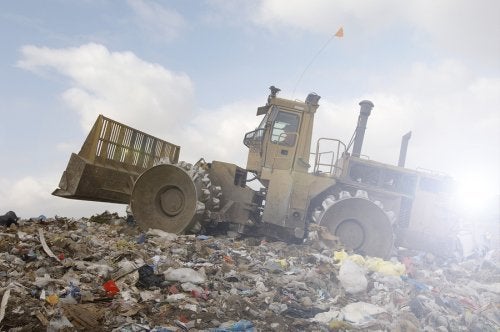
-
Exploring the Life Cycle of Electronics
Electronics play a critical role in the daily life of the average American. If you’re like many people who recycle near Atlanta, then you may have questions about the process of electronics or e-waste recycling. Read on for some insight into the life cycle of electronics and why your used devices should be recycled and not tossed into dumpsters.
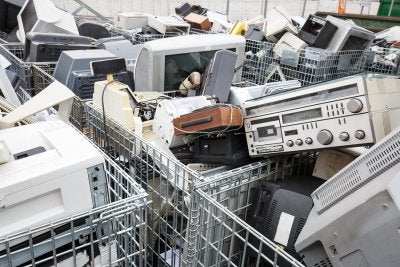
Mining
Materials like copper, platinum, gold, and iron are mined from the earth, refined, and then used to create a broad range of the electronics that people use every day. The process of refining raw materials produces greenhouse gas emissions and requires a significant amount of energy. For these reasons, recycling the materials used to make electronics conserves energy and benefits the environment.
Manufacturing
Next, the refined materials are used in the manufacturing of electronics. Some manufacturers also use recycled materials during this process. Then, the electronics are sold and used.
Purchasing
When purchasing electronics, it’s ideal to choose those that are designed with environmentally friendly features. Also, select those products that are made with durability, longevity, and recyclability in mind if you want to reduce your environmental impact.
Collecting
Ideally, all used electronics would be disposed of through a certified electronics recycler. This step can be done in a variety of ways. For example, electronics retailers and community centers often have e-waste recycling bins. Also, some companies offer warranty and mail-in programs that reward consumers for sending in their old devices. These used products can be refurbished or recycled, cutting down on the need for mining and processing new materials. Unfortunately, some used electronics are thrown in waste bins and disposed of in landfills. Once this happens, the valuable materials used to make the electronics cannot be recovered and recycled.
Recycling
Those electronics that do make it to an e-waste recycling facility are dismantled before being sorted into categories of valuable and recyclable materials, such as aluminum, gold, glass, and copper. Then, the materials return to the supply chain where they can be used to create new electronics and other products.
-
What Is Creative Reuse?
Recycling serving Atlanta can be done in quite a few different ways . Recycling can be broken down into downcycling and upcycling, and the latter is also known as creative reuse. In some senses, creative reuse is the most productive form of waste disposal because it aims to turn unwanted or unused items into something more practical or valuable. You can apply the principles of creative reuse to almost anything, and thinking outside the box can go a long way. Keep reading if you’d like to learn a little bit more about creative reuse.
The purpose of upcycling and creative reuse is to add value to an existing product. This is in contrast to downcycling, which takes a product and recycles it in a way that gives it less value. Upcycling is particularly popular in the art community. With a creative eye, you can take old, broken, or worn out products and use them to create interesting sculptures, still life paintings, or unique photographs. By repurposing old materials that would otherwise be thrown away, you save room in landfills and get to enjoy more valuable products. As is the case with all recycling, this goes a long way in protecting the environment.
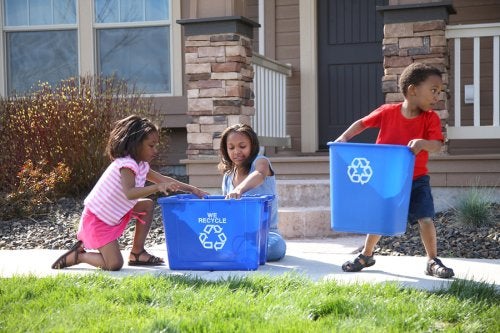
-
Start Planning for America Recycles Day
As effective as recycling serving Atlanta can be, it can only make a difference if everyone commits to the cause. It’s important to raise awareness of the importance of responsible waste disposal, and people can only employ the right practices if they understand them. The purpose of America Recycles Day is to spread the word and educate people about the processes and benefits of recycling and responsible waste management. It’s also easy to find the materials you need to keep your community educated and motivated. Feel free to continue reading, and be sure to start planning for America Recycles Day .
America Recycles Day is a nationwide holiday that encourages people to celebrate the power of recycling and sustainability. There are events held all over the country that are dedicated to teaching people how to recycle, what the process is like, and what kinds of materials can be recycled. People of all ages should understand how the practice of recycling can reduce our collective carbon footprint, keep waste out of landfills, and bring reusable materials back into circulation. From elementary school classrooms to corporate offices, people everywhere can come to recognize the importance of sustainability thanks to America Recycles Day events.
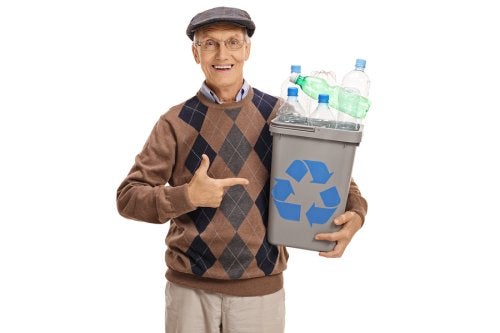
-
The Differences Between Solid, Hazardous, and Toxic Waste
There are all different types of waste near Atlanta, and the way you should handle your waste depends on the kind that you’re dealing with. The terms solid, hazardous, and toxic are 3 adjectives used to describe different types of waste. While solid waste is relatively easy to recognize and understand, the terms hazardous and toxic tend to throw people off. Knowing what kind of waste you have is important when it comes to choosing the proper type of waste disposal, and you can always ask your waste management professional for help . Keep reading for a brief overview of the differences between solid, hazardous, and toxic waste.
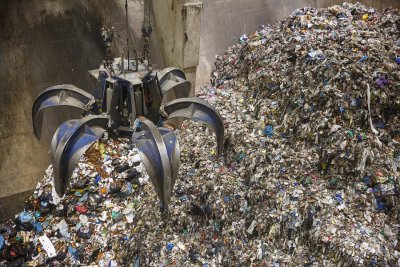
Solid
The category of solid waste might seem self-explanatory, but it may also include more than you expected. Solid waste refers to the garbage in your trashcans, but it also includes wastes of different states of matter. Liquid and gaseous wastes, like sludge and pollutants, can also fall under the umbrella of solid waste. Municipal solid waste, or MSW, is the name for general solid waste that comes from public garbage cans or residential homes. Much solid waste can be recycled, especially materials like plastic and aluminum, but a great deal of it also ends up in landfills.
Hazardous
When a waste material is considered hazardous, it no longer fits within the realm of solid waste. However, hazardous waste is not exactly the same as toxic waste. The Environmental Protection Agency outlines a few criteria that can qualify a particular type of waste as hazardous. Waste that is corrosive, flammable, or reactive can be considered hazardous, but toxicity is also a potential component of hazardous waste. It’s important to handle hazardous waste carefully, which is why the job is usually left for the professionals.
Toxic
Unlike solid and hazardous wastes, toxic waste is a very specific type. According to the Environmental Protection Agency, waste must be harmful or deadly to people or animals that ingest it. Thus, toxic waste still falls under the category of hazardous waste, but it’s not the same thing. You will also need a professional to handle toxic waste.
-
Easy Ways to Reduce Landfill Waste
We use landfills to take care of waste that we can’t recycle, but that doesn’t mean landfills are foolproof. This form of waste disposal can still harm the environment, so the practice is not quite as healthy as recycling serving Atlanta. Take a look at this video for a few easy ways to reduce landfill waste.
Recycling helps to keep waste out of landfills, but it’s not the only method you can use. When you bring your own bags to the grocery store, you won’t have to waste the bags that they offer you. If you forget your own reusable bags, ask for paper bags because they biodegrade more quickly. You should also consider printing on both sides of the sheet, and hold onto scrap paper so you can compile your scraps into a new notepad. Try to buy recycled products, and use food waste and yard trimmings for composting.
-
Are You Doing Everything to Reduce Your Carbon Footprint?
We live on the only inhabitable planet that we know of, so it makes sense that we should do what we can to take care of it. If everyone took steps to reduce their carbon footprints, we could leave a healthier environment for future generations. The good news is that there are countless ways you can go green. From the way you use the energy in your home to recycling serving Atlanta, everyone has the ability to make the push towards sustainability. Think about your energy usage, waste disposal, and traveling routines, and read on to see if you are doing everything to reduce your carbon footprint.
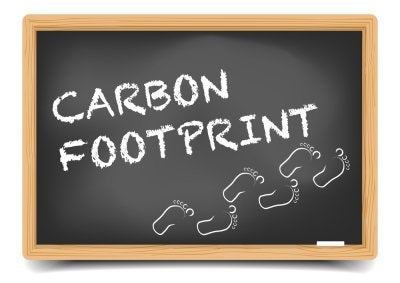
Home Energy
You need to power your home, but there’s a right way and a wrong way to do it. If you want to reduce your carbon footprint and extend the lifespan of your heating and cooling appliances, make sure you keep your windows and doors closed when you turn on the heater or air conditioner. This will trap conditioned air inside, rather than letting it escape and mix with air from the exterior of the building. You can also invest in home automation technology like smart lighting and set your appliances to remote timers.
Waste Management
People generate an almost unfathomable amount of waste, and it all needs to go somewhere. Landfills are filling up with trash, and much of it could have been reused. You can get started on reducing your carbon footprint by committing yourself to recycling. Recycling is one of the most responsible ways to handle waste management, and it’s easy for anyone to do. This practice takes materials from used products to create brand new products, which spares virgin materials and saves energy.
Driving and Travel
As fun as a joyride in a new car can be, it’s a good idea to think about when you absolutely need to drive and when you might be able to walk. If you’re taking a quick trip into town for a bite to eat, you can even consider riding a bicycle to limit your emissions and reduce your carbon footprint.
-
Are You Recycling These Common Items?
Not everyone is certain about what kinds of materials they can and can’t recycle near Atlanta. You are most likely aware that you can throw your glass bottles and aluminum cans in recycling bins, but what do you do with your electronic equipment? A lot of your old electronics can be recycled, and yet tons of reusable electronics end up in landfills instead. Keep in mind that there are sometimes special pickup requirements when it comes to materials like batteries and light bulbs. Take a look ahead and ask yourself if you’ve been recycling these common items.
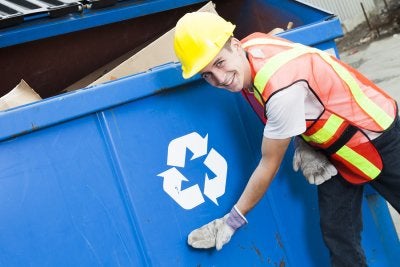
Bottles and Cans
In this day and age, it’s a lot less common to see someone throw an aluminum can or a plastic bottle into a garbage rather than a recycling bin compared to just a few years ago. Containers that hold sports drinks, sodas, and beer are extremely recyclable, and it takes very little effort on the part of the consumer. Aluminum is so recyclable that the next can of soda you buy might be made from a can that you threw away just a couple of months ago. If you aren’t recycling your bottles and cans yet, now is the time to start.
Electronics
It’s tough to escape technology these days, and everyone seems to be waiting at the edge of their seats for the next new mobile phone to come out. What many people don’t realize is that they can recycle their old devices. There are useful materials in your old laptops, desktop monitors, printers, and tablets. Even older electronics like CD and floppy drives, fax machines, and cabled mice can be recycled. Rather than throwing your old electronics out or letting them sit in a bin in your garage, consider recycling them and putting them back into circulation.
Batteries and Bulbs
Some people are unsure how to dispose of certain common items like batteries and fluorescent bulbs. While these items can be recycled and are often accepted, they might come with specialized pickup requirements. Talk to your waste management professional to see how you can go about recycling these items.
-
Exploring the Dangers of Trash
Everyone has to do something with the waste near Atlanta that they generate, or it will continue to pile up. Without trash pickup services, the aesthetic appeal inside and outside of your building may be at risk. Unfortunately, there are many other potential hazards in addition to reduced cosmetics. When waste piles up, it may ultimately attract pests. These pests are eyesores in themselves and can turn people away from your home or your place of business, and they can even spread disease to your family or your customers. Continue reading if you’re interested in exploring the dangers of trash.
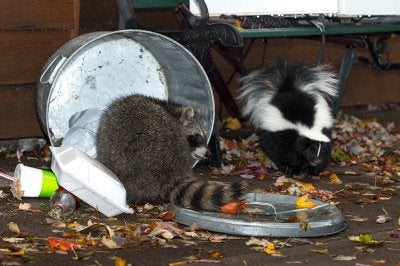
Cosmetic Eyesore
The curb appeal of a home or business place can impact the overall appearance of the neighborhood, which means everyone in the community may be concerned. If you allow waste to pile up on your property, keep in mind that you might be bringing down your neighbors’ property values. Some people let waste build up inside their buildings, which can also be detrimental. This will take away from the interior design scheme that you’ve worked so hard on, and it can reduce the overall value of your property. If you want to preserve your curb appeal, it’s a good idea to develop a waste management plan.
Attraction of Pests
If you know anything about pests, you know that they tend to show up when there’s a bunch of waste around. Neglecting your trash can serve as a warm welcome for all kinds of bugs, rodents, and pests, and they will further take away from the curb appeal of your house or business. Even if the waste problem is outside, the pests that it attracts may very well find their way in.
Introduction of Disease
Waste buildup and pest problems aren’t just aesthetic issues—both of these problems can actually be harmful to your health. The pests that come to check out your waste can spread disease through bites and physical contact as well as traces of urine and feces left behind. Make sure you establish a viable waste management plan to keep your space free of disease.
RECENT POSTS
categories
- Uncategorized
- Waste Management Atlanta
- Waste Disposal and Recycling
- Hazardous Waste Disposal
- Chemical waste removal
- solid waste removal
- R3 Program
- Sustainable Organizations
- Sustainable Waste Removal
- Commercial Waste Removal
- Materials Management Program
- Dumpster Rental
- Roll Off Dumpsters
- Construction Site Waste Removal
- Sustainability
- Recycling in Atlanta
- Industrial Recycling
- Industrial Waste Removal Services
- Southern Waste & Recycling
- Waste Removal Atlanta
- Waste Specialists
- Atlanta
- Infographic
- Front Load Dumpsters
- Rear Load Dumpsters
- Reusable Electronics
- Dump Truck Atlanta
- Recyclable Electronics
- Trash Compactors
- Recycling
- Recycling Program
- Office Recycling
- Metal Recycle
- Electronic Waste
